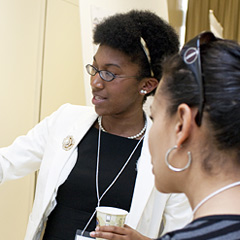Infinite Possibilities for Minority Women in Mathematics
Leaders across the country have called for the country to produce more scientists, engineers and mathematicians. Yet, despite the fact that minorities comprise the fastest-growing groups in the country, they are the least represented in science and engineering careers.
In mathematics, the disparity is particularly acute for underrepresented minority women. They account for less than 2 percent of all doctoral degrees awarded in mathematics each year, as well as less than 1 percent of incoming freshman majoring in the field.
“Changing those numbers goes beyond ‘the right thing to do,’” says Freeman Hrabowski, president of UMBC. “Minority women account for a growing proportion of college-ready students. Increasing their representation in mathematics is critical if the United States is to remain competitive on a global scale.”
To that end, on March 30 and 31, UMBC will host the fourth Infinite Possibilities Conference (IPC) for minority women in mathematics and statistics. The conference is designed to promote, educate, encourage and support minority women interested in the mathematical sciences.
“It can be very isolating, and easy to feel that you don’t belong in mathematics,” says Tanya Moore, one of the conference founders. “We wanted to give people an opportunity to see women all over the country just like them.”
Sue Minkoff, the local organizing chair for the conference and an associate professor of mathematics and statistics at UMBC, says the event is designed to connect aspiring and early-career mathematicians with mentors and role models, who can address concerns the women may have about differences between themselves and traditional mathematicians.
“IPC provides students at the high school, undergraduate and graduate levels with opportunities to interact with peers and more established female mathematicians in a supportive and collegial atmosphere,” she says.
Hosting the conference also supports UMBC’s overall mission. “We hope that hosting the conference here at UMBC will help us in our continued efforts to recruit minority women in mathematics and statistics at the faculty, graduate and undergraduate levels,” says Nagaraj Neerchal, professor and chair of UMBC’s department of mathematics and statistics.
Erika Camacho, an assistant professor of mathematics at Arizona State University and a slated speaker, says the conference provides a strong sense of community and belonging that is currently missing for women of color in STEM fields at most places. It allows women to become catalysts of change by supporting each other.
The agenda for the 2012 conference includes keynote speakers, research talks, poster sessions and panel discussions, ranging from advice for graduate studies to navigating paths beyond the degree.
The day before the conference, there will be a short course in mathematical biology, funded by the Mathematical Sciences Research Institute collaborative diversity program and organized by the Institute for Math and Its Applications at the University of Minnesota. There will also be a special program for high school students and teachers on Saturday.
(3/29/12)

